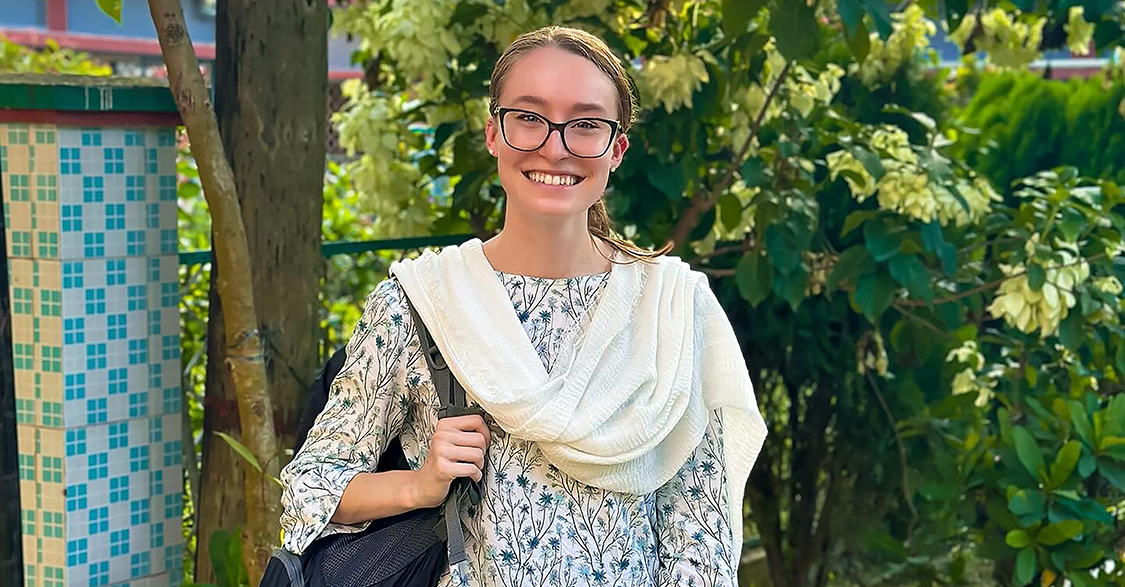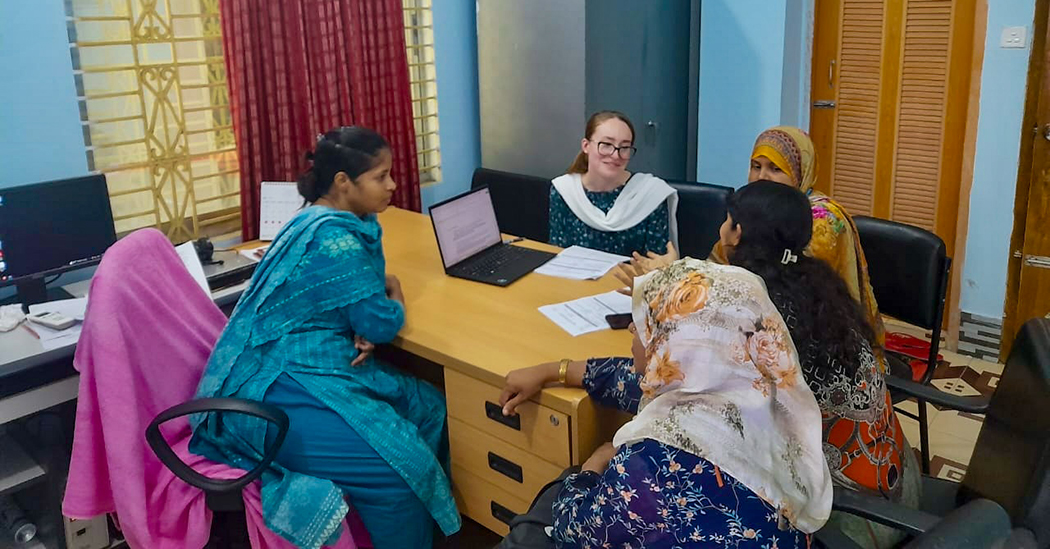Epidemiology student is an emerging leader in Global Health

Allison Baumgartner
Global Health Epidemiology
At the University of Michigan School of Public Health, students in the Global Health Epidemiology program are taking the lead in tackling some of the most pressing health challenges in low and middle-income countries.
These emerging epidemiologists are not confined to the classroom—they are out in the field learning, researching and implementing strategies that aim to improve public health across the globe. Their work is more than academic—it’s a mission to make a tangible difference where it's needed most.
Allison Baumgartner, a second-year master’s student from Raleigh, North Carolina, is the personification of this mission.
During spring break in February, Baumgartner and 14 of her Michigan Public Health classmates traveled to Grenada, a trip organized by the Public Health Action Support Team (PHAST). Then, she spent eight weeks in Araihazar, Bangladesh, during her summer internship and research collaboration with the University of Chicago Research Bangladesh.
LEARN MORE about Michigan Public Health.
In Grenada, Baumgartner worked on a three-year project aimed at developing a comprehensive dementia care plan in collaboration with the Ministry of Social Development. Baumgartner and her team interviewed family and community caregivers alongside formal retirement home staff across the island.
After conducting community interviews and undertaking a comprehensive review of existing research, a government strategy was formulated to address the escalating needs stemming from the ongoing aging population, a phenomenon that is observed globally and has a particular impact on Grenada’s community.
I was taking a community engagement class when I found PHAST. I was like, ‘This is exactly the place that I really wanted to be a part of.’”
“Our project was focused on making a comprehensive care plan strategy for the federal government to understand what is needed to formulate comprehensive strategies for elder care,” she said, emphasizing the importance of adapting theoretical knowledge to real-world settings. “It’s important to be present with the person or community sitting in front of me and saying, ‘What can I learn from this interview?’ Conducting fieldwork plays a crucial role in making a human connection in public health.”
The Grenada experience equipped Baumgartner with the necessary skills and confidence for her internship in Bangladesh. The practical experience she gained through PHAST serves as a foundation for conducting valuable community-based research in her fieldwork.
“I would say my work in Grenada far exceeded my expectations,” Baumgartner said.

During her internship, she conducted an exploratory, secondary data analysis focused on access to and utilization of maternal care, childbirth delivery methods, and breastfeeding among the Araihazar community, a semi-urban community just outside of Dhaka, the capital city of Bangladesh.
“In addition to conducting data analysis, I shadowed and chatted with clinical colleagues, asking questions and learning about maternal health care,” she said.
Baumgartner began her public health career focused on biostatistics and genetics but transitioned into epidemiology to engage more with communities while applying statistical methods. She values the balance of working with data and understanding real-world community experiences.
READ MORE about faculty, students, alumni and staff.
I think it’s important to combine your classroom knowledge with real-world experience. Get involved with programs like PHAST that let you work with communities and see the impact of your work up close.”
“You get to engage with communities and ask these really important questions while also getting to do the biostatistics alongside it," said Baumgartner, who earned a bachelor’s degree in Biostatistics from the University of North Carolina at Chapel Hill, where she also minored in chemistry and music.
The PHAST program was a significant factor in Baumgartner’s decision to attend the University of Michigan. The program’s emphasis on community engagement and practical applications of classroom knowledge deeply resonated with her.
“I was taking a community engagement class when I found PHAST,” she said. “I was like, ‘This is exactly the place that I really wanted to be a part of.’”
Baumgartner has been supported by generous scholarships at Michigan Public Health. She has received the Fedor and Mechthild Medzihradsky Global Internship, Gelman Global Scholarship Fund, and Natalie and Jack Blumenthal Internship Fund. These scholarships have enabled her to gain invaluable field experience and contribute meaningfully to global public health efforts in Grenada and Bangladesh.
SUPPORT research and engaged learning at Michigan Public Health.
Her journey is just beginning.
She is dedicated to making a difference and is ready to take on new challenges in public health. The skills and experiences she gained working in a global setting have prepared her well.
Baumgartner, who was elected president of the Public Health Student Assembly at the start of the Fall semester, is committed to supporting the Michigan Public Health student community this academic year by fostering cross-departmental and organizational engagement, idea-sharing, support and collaboration.
She has some advice for students who want to make a difference.
“I think it’s important to combine your classroom knowledge with real-world experience,” Baumgartner said. “Get involved with programs like PHAST that let you work with communities and see the impact of your work up close.”
From her impactful work in Grenada to her in-depth research in Bangladesh, Baumgartner’s journey highlights the power of applying classroom knowledge to real-world challenges.
As she continues to make a difference, she embodies the very spirit of Michigan Public Health’s Global Health Epidemiology program—turning academic learning into tangible change.
